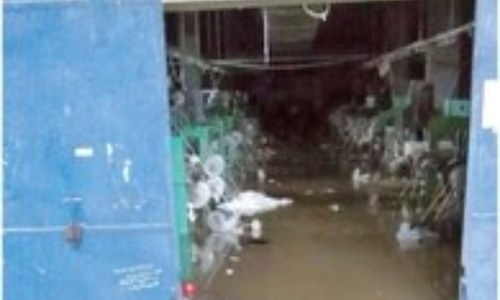The torrential rains followed by flash floods in August brought losses to the economy, destruction and interruptions in the operations of industrial units and the movement of raw material and goods in its wake.
Listed companies have not released any note of caution on any substantial damages to plants, production or sales, which provides reason to believe that companies are confident they will be able to ride out the challenge.
The lone voice of an entity in trouble — Pakistan Refinery Ltd that announced a temporary closure of operations owing to damages to its plant by rainwater and floods — has died down in the sound and fury of the ferocity of the bullish stock market, which saw the benchmark KSE-100 index cross the coveted 42,000-point level with soaring volumes last Wednesday. The number of shares traded in a single day peaked to 919 million, recording a 15-year high. The benchmark index has gained 53.6 per cent to reach 42,188 points in the last six months after hitting the pit at 27,228 in March on the onset of the pandemic. The expected initiation of construction work in the rain-affected areas kept the investors’ enthusiasm alive in the stock market, particularly cyclical cement and steel sectors.
‘We may miss deadlines for export orders, which can result in the loss of foreign markets’
Overall, sales of oil marketing companies in August grew 21pc year-on-year, but slowed 7pc month-on-month to 1.55m tonnes. The sequential decline in sales was attributed to heavy rains in addition to the fact that August is considered a slow month.
In the fertiliser sector, urea sales reportedly plunged 14pc in rainy August to clock in at 537,000 tonnes against 625,000 tonnes in the same month last year. “Similarly, sales will be down 7pc month-on-month primarily due to heavy rains across the country during August,” said Topline Securities analyst Sunny Kumar in his Sept 1 report.
Overall cement sales in August were expected to decline 25-29pc month-on-month wherein local sales were likely to be down by 27-33pc on a monthly basis owing to “record rainfall during the latter half of the month along with slower activities at the start of the month due to Eid holidays,” Shankar Talreja of the same brokerage house said.
The rains caused havoc to the industries engaged in the manufacturing of export-oriented goods. Besides the loss of production hours and damage to machinery and equipment, most factories remained without electricity. “We may miss the deadlines for the supply of goods to customers abroad, which can result in the loss of foreign markets,” lamented an exporter of readymade garments who had to close down his cottage industries owing to standing water and absence of electricity.
Trade associations estimated colossal losses of Rs50bn due to the disruption and destruction caused by the monsoon rains. “Flash floods that inundated the homes and shops in the old-city areas that have cloth and commodities markets, wholesalers and warehouses near the port caused unprecedented losses in August,” a member of the association said.
The already crumbling infrastructure could hardly hold in the face of a record rainfall with no drainage system. Water unsurprisingly entered shops and shopping malls. Many factories ceased to operate due to the actual and the dreaded damage to men and machines. The chairman of the All Karachi Tajir Ittehad estimated a loss of revenue of up to Rs25bn as the markets remained closed for a week. Even the adviser to the prime minister on commerce and investment, Abdul Razak Dawood, had to caution that exports in August could be subdued due to heavy disruptions caused by the rains and floods.
Ahmed Chinoy, elected director of the Pakistan Stock Exchange (PSX), said the raging bull market suggested that corporates had no serious complaints of damages or losses. However, Mr Chinoy, who also chairs the All Pakistan Cloth Merchants’ Association, lamented that the wholesale and retail cloth merchants in Karachi’s old areas — Kharadar, Mithadar, Kagzi Bazaar and Marriott Road right up to West Wharf — had suffered enormous damages to their inventory. He estimated their loss to range between Rs4bn and Rs5bn. He said the association was trying to provide assistance to those affected by the calamity.
Prominent businessman Majyd Aziz said industrial units located near nullahs suffered tremendously. He stated that most textile companies stored their raw material, including imported value-added fabrics, in the basements of their units that were completely ruined. Rainwater combined with sewage swamped their basements and destroyed not just the raw material and finished and packaging goods but also documents and financial accounts that were stored there.
Mr Majyd said industrial units usually maintain raw material inventory for over five to six months. “As we are still in the midst of the pandemic, the record rainfall and floods have added fuel to the fire that ravaged industrial units,” he said.
The government, itself short of cash, could not be looked upon to mitigate the damage suffered by industrial and trading entities. An exporter of garments in Kharadar said traders were too small to take out comprehensive insurance policies. Insurance companies generally provide cover to plants and raw material against theft, fire and sometimes civil commotion.
Published in Dawn, The Business and Finance Weekly, September 7th, 2020

















































